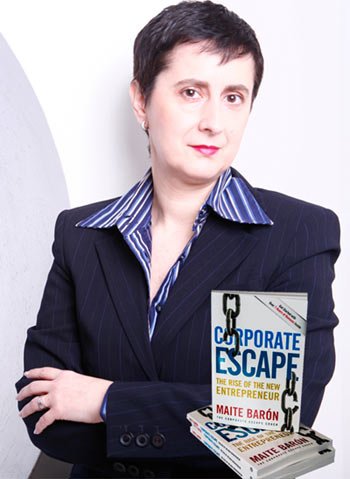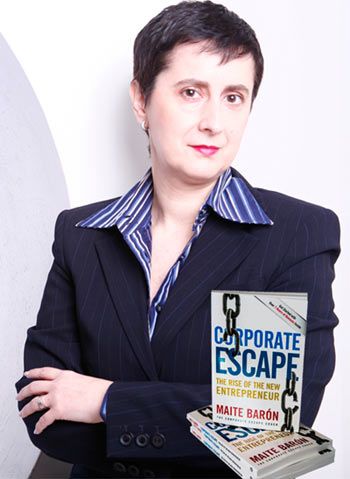WHY SHOULD LEADING WOMEN IN FINANCE AND BUSINESS WANT TO BANK ON LLOYDS’ AMBITIONS?
Published by Gbaf News
Posted on March 1, 2014
6 min readLast updated: January 22, 2026

Published by Gbaf News
Posted on March 1, 2014
6 min readLast updated: January 22, 2026

Many women will back themselves to succeed outside corporate tired of old conversations and empty promises
By Maite Barón, CEO, The Corporate Escape™

Maite Barón, CEO, The Corporate Escape™
With research suggesting that it will take more than 70 years for Britain’s top 100 companies to achieve gender-balanced boardrooms, Lloyds Banking Group is taking a bold initiative and looking to accelerate the process by actively encouraging women into its leadership roles.
If it manages to stay on track with this corporate commitment, the bank will hit its own measure of gender ‘equality’ – 40% or more of the Group’s 8,000 top jobs held by women – by 2020.
In so doing it would become the first FTSE company with a managerial composition bearing some resemblance to the demographics of its customers.
According to Fiona Cannon OBE, Director of Diversity and Inclusion at Lloyds Banking Group, the key to achieving this transformation is to identify, understand, then remove the obstacles that stop women (and men) from reaching their full potential. Do this and you ‘create supply in the corporate pipeline’, ensuring there are sufficient numbers of talented individuals ready to step onto the escalator going up.
As the nine-to-five working model increasingly fails to fit in with our lives, and careers that having started at 16 or 18 cannot easily be pursued for the next 40 or 50 years, Fiona is eager to find ways to accommodate a career path that can be ‘stop-start’ and ‘zig-zag.’
In an interview with The Guardian, she explains that Lloyds wants “to blaze a trail for our industry to become more gender diverse, but we will only be able to achieve our goal if we create a meritocratic organisation for all colleagues. So our work will be looking at how we attract, develop and retain a range of diverse talent, not just women.”
However, with just 27% of such posts currently held by women, this is an ambitious challenge and one that raises a number of interesting points, not least about the whole can of worms that opens up with ‘positive discrimination’.
Few would argue against the idea of creating meritocratic organisations in which talent and diversity can flourish. But whenever you seek to correct an imbalance at a macro level by giving a ‘leg up’ to some, you invariably and immediately discriminate against others. That’s just the way of things. Even if you remove impediments to progress so that everyone can – in theory – move forward at the same rate, those coming from behind can never catch up … unless they are selected for ‘special treatment’, creating resentment and suspicion.
This is a problem in any walk of life, and one that can only be overcome by carefully and consistently ‘selling in’ the idea. The bank has already begun the process of communicating its vision to employees. But real-world reactions to initiatives will only come later, when and if people are adversely affected by them.
On a day-to-day level, it will come down to whether the processes and systems that Lloyds puts in place are robust enough to achieve its goals.
And one of the ways in which it’s suggested that women and those from ethnic minorities will be able to ‘catch up’ is by being sponsored by senior executives.
But, if you make gender (or race) a component of selection, don’t you leave yourself open to action under equality legislation? Shouldn’t an initiative provided to one group be offered to all?
I’m sure that Lloyds will have taken a long hard look under the bonnet at all of this and duly considered the more contentious issues.
And while I can of course see the value in picking up talent and fast tracking it to the top, what about older women already in the banking sector? How will they fare under the new regime?
Will they even be considered suitable ‘sponsorship’ material given that potential sponsors may already have ‘pre-formed’ views?
There’s also the issue of timing.
Can Lloyds bring more than 1,000 women through the pipeline over the next 5-6 years, and where are they all going to come from?
And if the 8,000 top jobs aren’t to swell to 9,000, a percentage of males will have to relinquish their posts to make way for them. Who will go and when?
It’s easy to pick holes in any proposal, and Lloyds’ efforts to level the playing field have to be applauded. I’m sure that such an initiative will have some impact, but I can also see how many could feel that this effort has come too late. Women are tired of waiting for things to change, which is why many are taking the lead and making change happen for themselves.
Lloyds’ plans are predicated on the belief that young career-minded women (and men) still want to take their place in a corporate world. However, with corporate organisations not high in the popularity stakes, and the banking sector seen as particularly tormented, this can’t be taken for granted, particularly when there are so many exciting new industries and businesses erupting in every direction.
For me the big question is how can we be in the 21st century and still be having to deal with what are basic human issues?
Of course, being able to say your organisation is ‘women friendly’ is a potentially powerful marketing pitch to potential recruits, and that is to Lloyd’s advantage. At least it makes them appear forward thinking in what is a still very dominated male culture.
However, as we also know it’s one thing to say that you are ‘doing the right thing’ and being politically correct, but it’s far harder to actually make that happen!
But, with the growing inclination towards entrepreneurship – the latest quarterly labour market data, published by the Office for National Statistics (ONS), shows that while the number of those ‘employed’ people rose by just 0.2 per cent over in the last quarter, while the numbers in self-employment went up by 4.1%! – more and more bright and talented women may choose to go it alone as the way to gain control and secure their own futures. Running their own business, they are not simply independent, but able to generate rewards determined by their own effort and not the patronage of others.
As business owners, they also have the opportunity to ‘make their mark’ and generate some sort of personal legacy. Perhaps most of all, it gives them the opportunity to be in a top job right from the start.
At The Corporate Escape, preparing professionals for success in the future world of work is our passion, so why not discover how we could help you? Download our free guide – ‘7.5 Strategies to Thrive in Your Career or Business’ – be confident about the future, there are many opportunities that are waiting for you.

Explore more articles in the Business category











